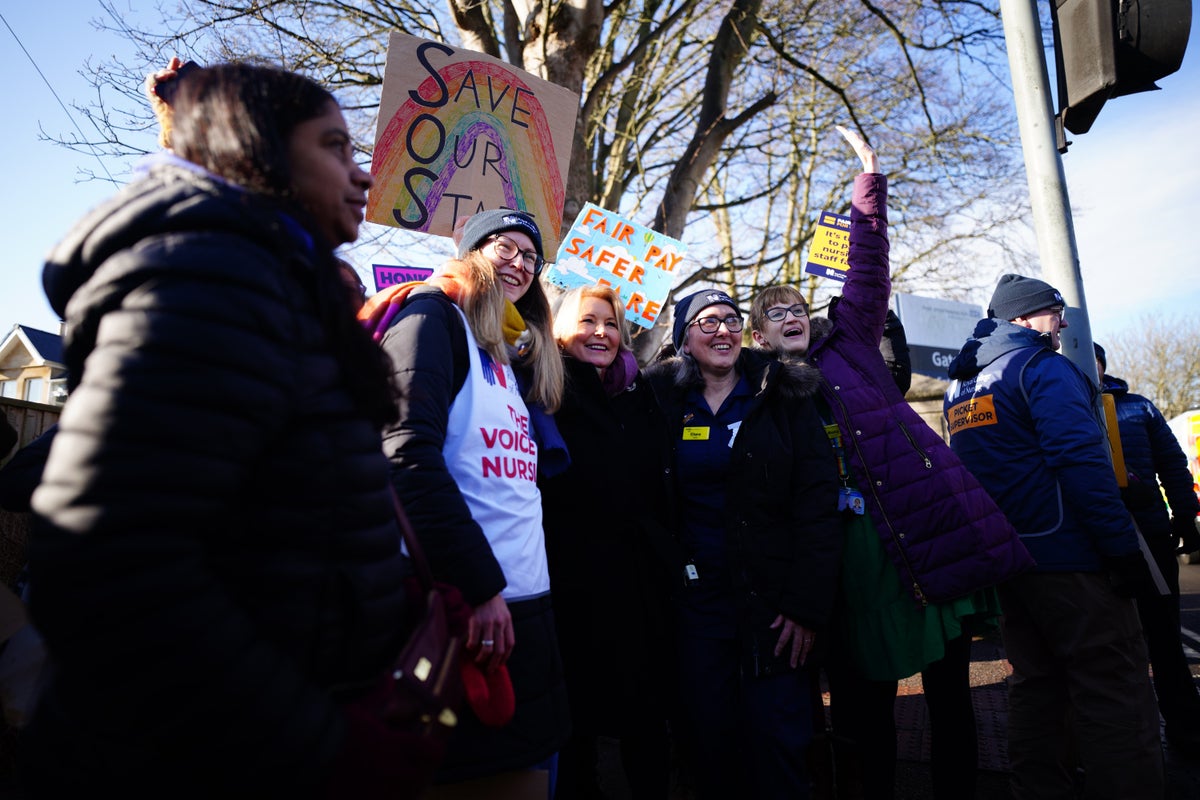
NHS leaders have welcomed the news that the Government has invited all health unions involved in strikes to sit down and talk.
The Department of Health said it would “talk to all unions who are willing to discuss what is fair and reasonable”, but planned strikes would need to be called off before talks could start.
The NHS Confederation welcomed the news of fresh talks that have the potential to avert further industrial action.
It comes as the Royal College of Nursing (RCN) last week began its own intensive discussions with the Government as it seeks a pay rise for its staff.
We would hope that all trade unions representing healthcare professionals across the NHS accept this olive branch from the Government— Matthew Taylor, NHS Confederation
However, junior doctors’ leaders said talks held with Health Secretary Steve Barclay on Thursday morning were a “facade” and that strikes planned for later this month will go ahead.
A Department of Health and Social Care spokesperson said: “We have been clear we are happy to talk to all unions who are willing to discuss what is fair and reasonable.
“We have invited the NHS Staff Council, who represent Agenda for Change unions, to join a series of intensive talks beginning this week covering pay, terms and conditions improvements and productivity enhancing reforms. Any deal needs to strike a balance between giving NHS staff a fair deal and delivering on our promise to halve inflation this year.
“In order for talks to start, all planned strike action must be called off with immediate effect.”
Matthew Taylor, chief executive of the NHS Confederation, said: “Healthcare leaders will welcome the news that the Government has offered to open talks with all unions involved in the strikes.
“We have been calling for the Government time and again to open negotiations with all unions and this is a very positive step in the right direction.
“We would hope that all trade unions representing healthcare professionals across the NHS accept this olive branch from the Government and are prepared to come to the table with the aim of reaching a compromise with the Government as quickly as possible.
“We need to bring an end to this war of attrition we have seen over the past few months and get back on track, continuing to tackle NHS waiting lists and treating as many patients as quickly as possible.”
The Government has finally realised what we’ve been saying all along – they need to talk pay now— Rachel Harrison, GMB
Sara Gorton, Unison’s head of health, said unions were considering the Government’s offer of talks.
She said: “Health unions will need to clarify the basis upon which talks can get under way through the NHS staff council.
“This includes understanding the status of the unilateral talks that have taken place with the Royal College of Nursing (RCN).”
Secretary of the NHS group of unions and Chartered Society of Physiotherapy assistant director of employment relations, Elaine Sparkes, added: “Once the picture becomes clearer, the unions will decide what to do next.”
Rachel Harrison, GMB national secretary, said: “The Government has finally realised what we’ve been saying all along – they need to talk pay now.”
She continued: “However, the Government has set some concerning preconditions and we need more clarity from them.
“Vague promises will not cut it – ambulance workers need to know that they are going to be spoken to seriously about pay.”
The BMA said on Thursday that Mr Barclay had held talks at the Department of Health without a mandate to negotiate.
Co-chair of the BMA junior doctors’ committee Dr Robert Laurenson told the PA news agency: “We came here with a mandate and he turned up without one, there was never any real prospect of any real negotiation or offer – it was just a facade.”
He said Mr Barclay did not offer any sort of timeframe for negotiations.
He added: “The Government aren’t taking us seriously. I don’t understand how the Government can look at a mandate that’s one of the strongest industrial mandates in history and essentially not have any preparations made or anything to put on the table.”
It comes as teachers in Wales and the south of England strike on Thursday in a long-running dispute over pay.
It is the third day of walkouts by National Education Union (NEU) members after teacher strikes took place in northern England on Tuesday and the Midlands and eastern regions of England on Wednesday.
The NEU has estimated that around 200,000 members will strike across the three days of action this week, with the “majority of schools” expected to either restrict access to pupils or fully close.







